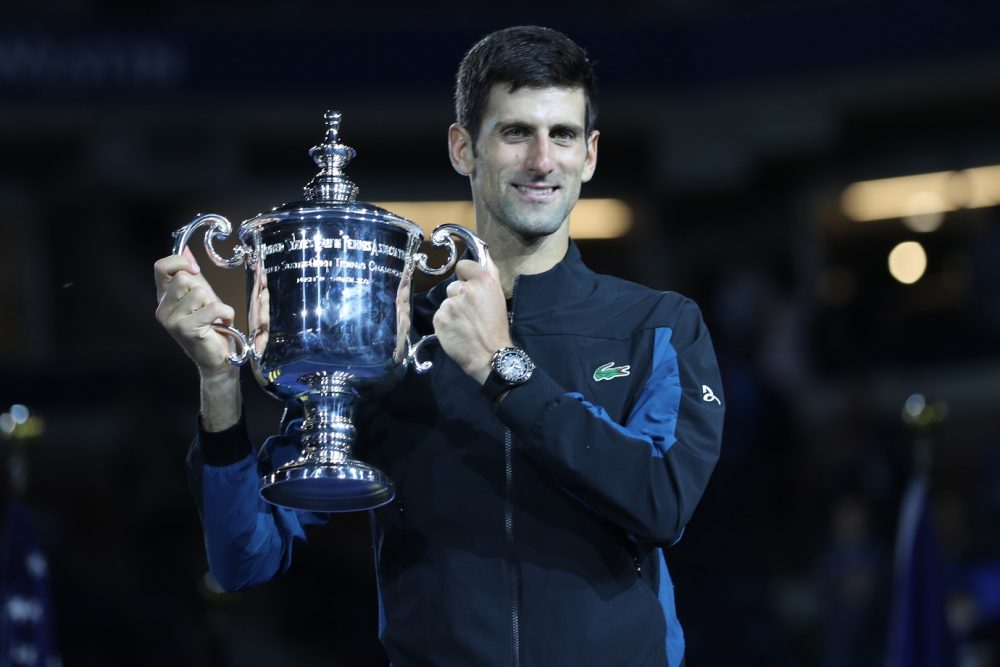Since the early nineties, tennis fans have been spoiled, bearing witness to the exceptional talents of the men’s singles ‘big three’: Novak Djokovic, Rafael Nadal and Roger Federer. Between the three champions and legends of the sport, they have a combined total of 54 Grand Slam titles – with Federer leading the way with 20, Nadal with 18 and Djokovic with 16. The US Open 2019 is just around the corner and again the three are a dominant force in the tournament, with 11 wins between them. The big question is, can anyone dismantle them?
US Open Successes
Between the years of 2004 and 2018, there have been just four occasions where one of the ‘big three’ haven’t won the US Open and just once has the final not been contested by Djokovic, Nadal or Federer.
The Swiss maestro leads the way with five victories in the tournament, winning it five years consecutively, between 2004 and 2008. Since then, Federer has also lost two finals, the most recent being in 2015 to Djokovic.
Djokovic is the current holder of the US Open men’s singles title, beating Argentine Juan Martin del Potro in straight sets: 6–3, 7–6(7–4), 6–3 to record his third victory in the tournament. One of the men to previously dismantle the ‘big three’ is del Potro himself – he beat Roger Federer in 2009 to win his only Grand Slam to date.
Nadal also holds the title three times, and in his first two victories, beat Djokovic.
Both finals (2010 and 2013) went to four sets; while he also lost to the Serb in 2011. His most recent victory at the Arthur Ashe Stadium was in 2017 when the Spaniard beat Kevin Anderson of South Africa: 6-3, 6-3, 6-4.
Other winners
As we have already mentioned, del Potro was the first man to dismantle the ‘big three’ in 2009. Since then, we have seen Andy Murray win the Grand Slam in 2012. He beat Djokovic in a thrilling encounter: 7–6(12–10), 7–5, 2–6, 3–6, 6–2 to win what was his first major title. Murray hasn’t yet confirmed if he will be playing at the Open this year, having recently returned to the sport, following hip surgery. His doubles campaign at Wimbledon saw him make round two in the men’s competition, and the third round in the mixed doubles – so who knows if he’ll be up for singles tennis just yet. You’ll find the Scot priced 33/1, while de Potro’s odds are more favourable at 20/1.
More recently, Marin ?ili? won his first – and only – Grand Slam to date, beating Japan’s Kei Nishikori in straight sets: 6-3, 6-3, 6-3. 2014 was certainly more open to a new winner, with defending champion Nadal ruled out, due to a wrist injury. In the semi-finals, Nishikori beat Djokovic, while ?ili? recorded a straight-sets victory over Federer – making it the first final in 12 years not to feature one of the ‘big three’.
2016 saw a Swiss star take home the trophy, but his name was not Federer. Stan Wawrinka beat Djokovic to win his third major title in as many years. The former world number 3 is a Wimbledon title short of a career Grand Slam.
US Open 2019
Looking ahead to the final major of the year, who, if anyone can topple the ‘big three’? There are plenty of ‘up-and-coming’ stars of the men’s game, while we’ve already named a few players who would probably have been more successful if it wasn’t for the dominance of Djokovic, Nadal and Federer in singles tennis.
Young German Alexander Zverev (12/1) is one of the rising stars and he has the shortest odds. He’s the second-youngest player in the ATP top 10 and at 22-years-old, Zverev has already won the ATP Tour Finals. Unfortunately, he hasn’t really set the Grand Slam scene alight, with two French Open quarter-finals his best performance across the board.
Other possible contenders for the title include Milos Raonic and Dominic Thiem (33/1). Both players are yet to win a Grand Slam, but have 21 career titles between them and have featured in the ATP top five.
If we’re honest, we can’t see anyone else but the ‘big three’ winning the US Open, but with Federer surely close to retirement and injuries holding Nadal back somewhat, maybe the ‘new age’ of tennis stars will come through sooner than we think.





















